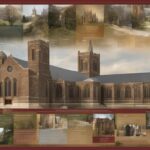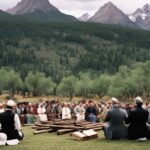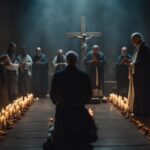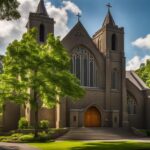The Jehovah’s Witnesses organization has a rich history and fascinating origins. It traces its roots back to the 1870s when it emerged as a branch of the Bible Student movement in the United States. Led by Charles Taze Russell, a Christian restorationist minister, the movement gained international recognition in the early 1900s.
Under the leadership of Joseph Rutherford, who took over after Russell’s death, significant doctrinal changes were introduced. It was during this time, in 1931, that the name “Jehovah’s Witnesses” was adopted, signifying a distinct identity within the broader Christian landscape.
Throughout its history, the organization has faced various challenges and undergone significant transformations. Today, the Jehovah’s Witnesses continue to thrive and carry forward their unique beliefs and practices.
Key Takeaways:
- The Jehovah’s Witnesses originated from the Bible Student movement in the 1870s.
- Charles Taze Russell played a significant role in the early development of the organization.
- Joseph Rutherford introduced doctrinal changes and the adoption of the name “Jehovah’s Witnesses” in 1931.
- The organization continues to grow and adapt to contemporary challenges.
- Stay tuned for more intriguing insights into the beliefs, practices, and community of the Jehovah’s Witnesses.
Beliefs and Doctrines
The beliefs and doctrines of Jehovah’s Witnesses distinguish them from mainstream Christianity. They hold unique perspectives on various theological concepts, challenging traditional interpretations.
Jehovah’s Witnesses reject the doctrine of the Trinity, which asserts that God is three distinct persons—Father, Son, and Holy Spirit—in one essence. They believe that only Jehovah, the Father, is God. According to their teachings, Jesus is not part of the Godhead but is a created being. Specifically, they see Jesus as the archangel Michael, the highest-ranking angelic being.
“While Jehovah’s Witnesses hold Jesus Christ in the highest regard, they do not worship him as Lord or God Almighty.”
This distinctive belief system places an emphasis on the imminent end of the world and the establishment of God’s Kingdom on earth. Jehovah’s Witnesses actively share this message, eagerly informing others about what they perceive to be the nearing fulfillment of biblical prophecies.
In contrast to mainstream Christianity’s belief in eternal punishment or the existence of hell, Jehovah’s Witnesses teach that the wicked will be annihilated rather than experience eternal torment. They believe that instead of everlasting suffering, the unrighteous will face complete and permanent destruction.
By adhering to these beliefs, Jehovah’s Witnesses strive to uphold their understanding of biblical teachings and to distinguish themselves as an organization focused on the worship of Jehovah.

**Note**: The provided image is an illustration and not representative of the actual beliefs of Jehovah’s Witnesses.
Sacraments and Rituals
Jehovah’s Witnesses have distinct practices when it comes to sacraments and rituals. Unlike traditional Christian denominations, they do not observe sacraments such as baptism and communion in the same way. Instead, Jehovah’s Witnesses engage in rituals that hold deep symbolic meaning for their faith.
Baptism: One of the key rituals in the Jehovah’s Witnesses’ tradition is baptism by total immersion. This act signifies a public declaration of dedication to Jehovah and the acceptance of his teachings. It is perceived as a personal choice and an essential step towards spiritual growth. The act of immersion symbolizes a cleansing and rebirth, aligning oneself with the principles and values of Jehovah’s Witnesses.
The Memorial: Another significant ritual observed by Jehovah’s Witnesses is the annual commemoration of Jesus’ death, known as the Memorial. This solemn occasion takes place once a year on the evening of the Passover. During the Memorial, Jehovah’s Witnesses gather to remember and reflect on the sacrifice of Jesus Christ. They partake in unleavened bread and red wine, symbolizing Jesus’ body and blood. However, it is important to note that only those who are part of the anointed class, totaling 144,000, are considered eligible to partake in the bread and wine.
These sacraments and rituals serve as powerful expressions of faith and dedication within the Jehovah’s Witnesses community. They provide opportunities for members to publicly proclaim their commitment to their beliefs and commemorate significant events in their spiritual journey.
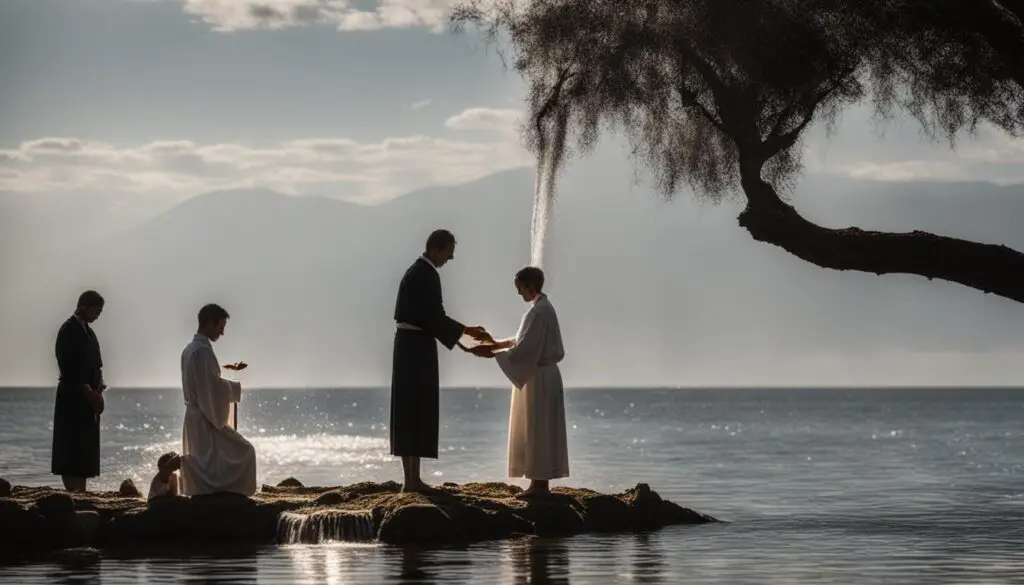
Sacraments and Rituals Table:
| Ritual | Description |
|---|---|
| Baptism | Public declaration of dedication to Jehovah through total immersion |
| The Memorial | Observance of Jesus’ death through the commemoration of unleavened bread and red wine |
Leadership and Clergy
The Jehovah’s Witnesses organization operates under a hierarchical leadership structure. At its helm is the Governing Body, consisting of a select group of male elders. These revered individuals provide essential spiritual guidance and establish organizational policies, shaping the direction of the Jehovah’s Witnesses organization.
Unlike traditional Christian denominations, Jehovah’s Witnesses do not have professional clergy or pastors. Instead, they value the collective involvement of their members in all aspects of their faith. In the eyes of the organization, every member is considered a minister and is encouraged to actively participate in preaching and evangelizing. This inclusivity fosters a sense of camaraderie and shared responsibility within the Jehovah’s Witness community.
Overseeing Congregation Affairs
Within each congregation, qualified male members serve as elders. These dedicated individuals are entrusted with the vital task of overseeing the affairs of their respective congregations. They provide spiritual guidance, ensure that congregation activities run smoothly, and offer support to fellow members in times of need.
Leadership within Jehovah’s Witnesses is not a position of power or authority, but rather a voluntary role taken on by those who demonstrate deep devotion, adherence to doctrine, and sincere dedication to their fellow believers. This model of decentralized leadership allows the organization to function cohesively while empowering individuals in their quest for spiritual growth and enlightenment.
Table:
| Leadership Structure | Responsibilities |
|---|---|
| Governing Body | Provides spiritual guidance and sets organizational policies |
| Elders | Oversee congregation affairs and offer spiritual support |
| All Members | Actively participate in preaching and evangelizing as ministers |
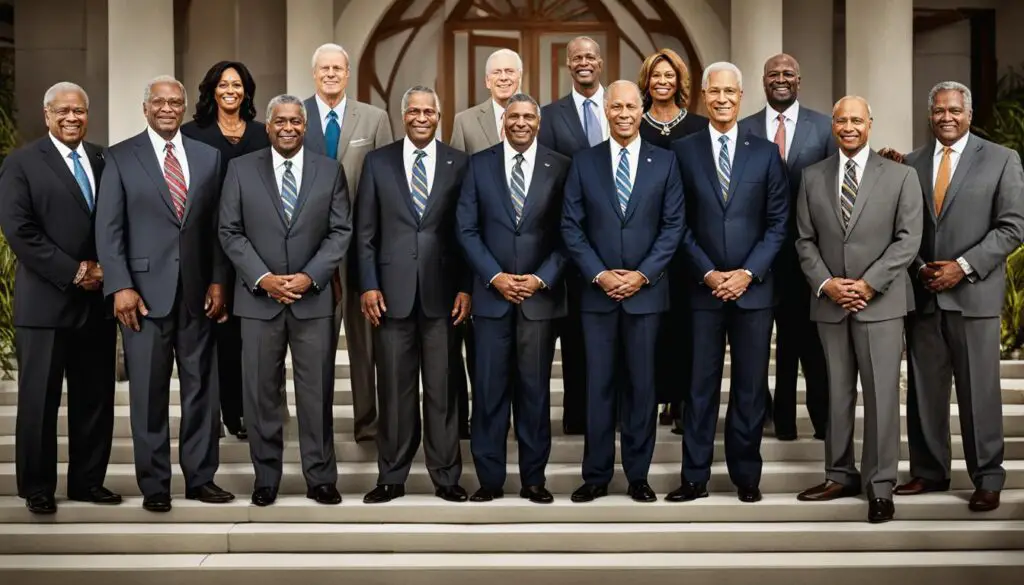
Worship Practices
Jehovah’s Witnesses have a unique approach to worship, rooted in their beliefs and practices. At the core of their worship is the study and interpretation of the Bible, which is considered the inspired and authoritative word of God. Congregation meetings held at their Kingdom Halls provide a space for Jehovah’s Witnesses to come together and engage in collective worship.
During these meetings, various activities take place, fostering spiritual growth and community building. Bible study is a fundamental aspect of Jehovah’s Witness worship, where members delve into the Scriptures to gain a deeper understanding of their faith and the teachings of the organization.
Another significant element of their worship is the singing of hymns. Jehovah’s Witnesses have a rich collection of songs that they sing together, expressing their devotion and gratitude to Jehovah. These hymns often reflect the organization’s core beliefs and provide a sense of unity among the congregation.
Group discussions play a vital role in Jehovah’s Witness worship. Congregants actively participate by sharing their insights, personal experiences, and reflections on the Bible’s teachings. These discussions foster a sense of community and enable members to learn from one another, strengthening their faith and understanding of the Scriptures.
Jehovah’s Witnesses also emphasize personal study and reflection as essential components of their worship. Individual members are encouraged to engage in independent Bible study, deepening their personal connection with God and furthering their spiritual growth.
Through their worship practices, Jehovah’s Witnesses seek to strengthen their relationship with Jehovah and live in accordance with their beliefs. By studying the Bible, singing hymns, participating in group discussions, and engaging in personal reflection, Jehovah’s Witnesses actively demonstrate their dedication to worshiping God.
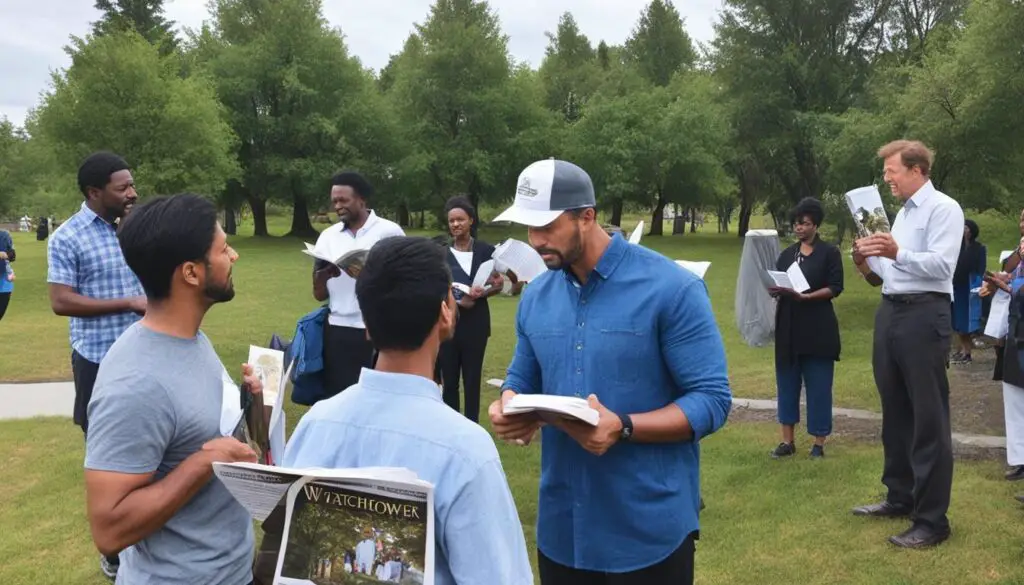
Sacred Texts
The Jehovah’s Witnesses recognize the Bible as their primary sacred text. They hold the belief that the Bible is the inspired and authoritative word of God, containing divine teachings and instructions for living a righteous life.
However, the Jehovah’s Witnesses use their own translation of the Bible, known as the New World Translation of the Holy Scriptures. This translation was produced by the Watch Tower Bible and Tract Society, the organization’s publishing arm.
The New World Translation is considered by Jehovah’s Witnesses to be the most accurate representation of the original text. It is used extensively in their publications, including books, magazines, and study materials.
One of the primary reasons for the creation of the New World Translation was to reflect the unique doctrinal beliefs of the Jehovah’s Witnesses. The translation incorporates specific renderings and interpretations that align with their theological framework.
“The New World Translation is not just another Bible translation. It is a faithful and reliable rendition that captures the true essence and meaning of God’s word as we understand it.”
As part of their beliefs, Jehovah’s Witnesses do not recognize any other religious literature as authoritative. They consider the Bible to be the sole source of divine revelation and guidance for their faith.

Through their devotion to studying and understanding the Bible, Jehovah’s Witnesses strive to apply its teachings in all aspects of their lives. The scriptures guide their beliefs, morals, and decisions, serving as an unwavering foundation for their faith.
Denominations and Sects
Jehovah’s Witnesses consider themselves to be a distinct Christian denomination, separate from other Christian denominations or sects. They firmly believe that they are the only true representatives of God’s Kingdom on earth. While there may be some variations in local practices and customs among different congregations, the core beliefs and teachings of Jehovah’s Witnesses remain consistent across the organization.
Distinct from Other Denominations
Jehovah’s Witnesses hold unique doctrinal positions that set them apart from mainstream Christianity. Their rejection of the Trinity and their belief that Jesus is a created being are significant theological differences. These distinct beliefs contribute to their classification as a separate religious group within the larger Christian landscape.
Unified Teachings
Despite being a distinct denomination, Jehovah’s Witnesses maintain a strong sense of unity based on their shared interpretations of scripture and the guidance provided by their organization. The governing body, made up of a small group of male elders, plays a central role in ensuring consistency of teachings and practices across congregations worldwide.
| Key Characteristics | Denominations | Sects |
|---|---|---|
| Recognition | Officially recognized by other Christian denominations. | Generally not recognized by mainstream Christianity. |
| Doctrinal Differences | Vary widely, ranging from minor theological nuances to significant deviations from mainstream beliefs. | Frequently demonstrate radical departures from mainstream Christian teachings and practices. |
| Autonomy | Often have a level of autonomy in governance and decision-making. | Tend to have a centralized authority structure, typically led by a single charismatic leader or group. |
| Membership | Numerous denominations with diverse membership. | Smaller, more exclusive groups with stricter membership requirements and often heightened devotion to particular teachings. |
While Jehovah’s Witnesses do not identify as a sect within Christianity, their firm adherence to their own unique interpretations of scripture sets them apart and distinguishes them from other denominations. The unity of their beliefs and teachings contributes to their sense of distinctiveness as a religious group.
Community and Outreach
Jehovah’s Witnesses are dedicated to building a strong, supportive community and engaging in outreach efforts to share their beliefs and values with others. Their commitment to community and outreach plays a vital role in their religious practice.
One of the most well-known practices of Jehovah’s Witnesses is their door-to-door preaching and evangelizing. This outreach method allows them to personally connect with individuals in their communities, share their beliefs, and engage in meaningful conversations. By going door to door, Jehovah’s Witnesses hope to reach those who may not have encountered their message otherwise.
In addition to door-to-door outreach, Jehovah’s Witnesses also organize regular meetings and social events within their congregations. These gatherings provide opportunities for members to come together, build relationships, and support one another in their faith. It fosters a sense of community and belonging.
Another aspect of community involvement for Jehovah’s Witnesses is their dedication to promoting moral values and engaging in charitable work. They actively participate in efforts to improve their local communities, whether it be through volunteer work, blood drives, disaster relief, or other acts of service. By actively demonstrating their faith through good works, Jehovah’s Witnesses strive to be a positive influence in society.
The community and outreach efforts of Jehovah’s Witnesses are driven by their genuine desire to share their beliefs and values with others. Through their personal interactions, community events, and acts of service, they aim to make a meaningful impact and contribute positively to society.
Contemporary Issues and Challenges
As with any religious organization, the Jehovah’s Witnesses face their fair share of contemporary issues and challenges. These challenges have tested the faith of the organization and its members, but they have also demonstrated resilience and perseverance.
One of the significant issues that Jehovah’s Witnesses have encountered is legal disputes surrounding their religious beliefs. For example, their refusal to accept blood transfusions, rooted in their interpretation of biblical principles, has led to conflicts with medical authorities and legal systems. Similarly, their objection to saluting the flag due to their belief in worshiping only God has resulted in legal battles over issues of patriotism and national identity.
Another issue that has brought scrutiny to the Jehovah’s Witnesses organization is the handling of child sex abuse cases within their community. Critics argue that the organization’s policies, which involve handling such cases internally rather than involving external law enforcement, have allowed abusers to go unpunished and survivors to suffer. This issue has prompted calls for increased transparency and accountability.
Furthermore, Jehovah’s Witnesses have faced bans and persecution in certain countries, most notably in Russia. The Russian government has labeled the organization as extremist and banned its activities, leading to arrests and the confiscation of property. Despite these challenges, Jehovah’s Witnesses remain steadfast in their commitment to their beliefs and continue to practice their faith under difficult circumstances.
FAQ
What is the history of the Jehovah’s Witnesses?
The Jehovah’s Witnesses originated as a branch of the Bible Student movement in the United States in the 1870s. It was started by Charles Taze Russell, a Christian restorationist minister. The movement began to gain international recognition in the early 1900s, with branches established in England, Canada, Germany, and Australia. Joseph Rutherford took over as the leader after Russell’s death and introduced significant doctrinal changes, leading to the adoption of the name Jehovah’s Witnesses in 1931.
What are the beliefs and doctrines of Jehovah’s Witnesses?
Jehovah’s Witnesses reject the doctrine of the Trinity and believe that only Jehovah, the Father, is God. They also believe that Jesus is not part of the Godhead but is a created being, specifically the archangel Michael. Jehovah’s Witnesses emphasize the imminent end of the world and the establishment of God’s Kingdom on earth. They do not believe in the existence of hell, teaching that the wicked will be annihilated rather than endure eternal punishment.
What sacraments and rituals do Jehovah’s Witnesses practice?
Jehovah’s Witnesses engage in two key rituals: baptism by total immersion, as a public declaration of their dedication to Jehovah, and the observance of the annual commemoration of Jesus’ death, known as the Memorial. Only those who are part of the anointed class, totaling 144,000, should partake in the bread and wine during the Memorial. They do not practice traditional Christian sacraments such as baptism and communion.
How is the leadership structured within the Jehovah’s Witnesses organization?
The Jehovah’s Witnesses organization is structured hierarchically. The Governing Body, composed of a small group of male elders, provides spiritual guidance and sets organizational policies. All other members of the organization are considered ministers, as they are expected to actively participate in preaching and evangelizing. Jehovah’s Witnesses do not have professional clergy or pastors. Qualified male members serve as elders and are responsible for overseeing congregation affairs.
What are the worship practices of Jehovah’s Witnesses?
Worship for Jehovah’s Witnesses occurs through regular congregation meetings held at their Kingdom Halls. These meetings include Bible study, singing hymns, and participating in group discussions. Jehovah’s Witnesses place significant emphasis on the study and interpretation of the Bible, which is considered to be the inspired and authoritative word of God. They also engage in personal study and reflection.
What is the sacred text used by Jehovah’s Witnesses?
The Jehovah’s Witnesses recognize the Bible as their primary sacred text. They use their own translation, known as the New World Translation of the Holy Scriptures, which is published by the Watch Tower Bible and Tract Society. This translation is used in all their publications and is considered to be the most accurate representation of the original text. They do not recognize any other religious literature as authoritative.
Are Jehovah’s Witnesses considered a distinct Christian denomination?
Yes, Jehovah’s Witnesses consider themselves to be a distinct Christian denomination. They do not officially recognize other Christian denominations or sects. They believe that they are the only true representatives of God’s Kingdom on earth. While there may be variations in local practices and customs among different congregations, the core beliefs and teachings of Jehovah’s Witnesses remain consistent across the organization.
What community and outreach activities are undertaken by Jehovah’s Witnesses?
Jehovah’s Witnesses place great importance on community and outreach. They engage in door-to-door preaching and evangelizing, seeking to share their beliefs and recruit new members. They also organize regular meetings and social events to foster a sense of community among their members. Jehovah’s Witnesses are encouraged to be active in their local communities, promoting moral values and engaging in charitable work.
What are some contemporary issues and challenges faced by Jehovah’s Witnesses?
Jehovah’s Witnesses have faced legal disputes around issues such as refusing blood transfusions and refusing to salute the flag. They have also faced criticism for their handling of child sex abuse cases within their organization. Additionally, Jehovah’s Witnesses have experienced persecution and bans in certain countries, including Russia. Despite these challenges, the organization continues to grow and adapt to changing circumstances.




